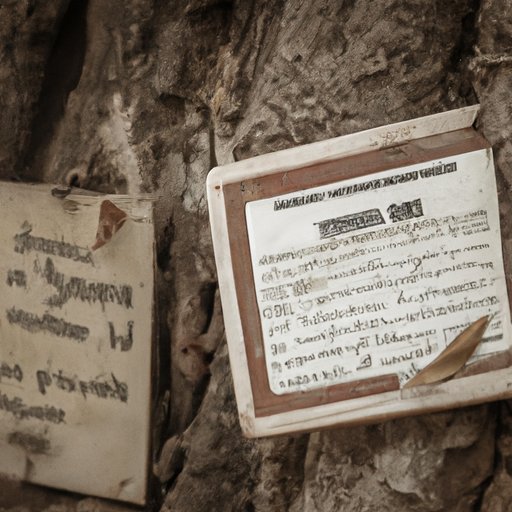Introduction
When thinking about the Vietnam War, the first thing that comes to mind is likely the staggering loss of life. The Vietnam War was one of the deadliest conflicts in modern history, and its human toll continues to shock and impact us today. In this article, we will explore the number of lives lost during the Vietnam War, examine the broader impact of these losses, and discuss why it is important to remember and honor those who made the ultimate sacrifice.
The Human Cost of War: A Look at the Number of Lives Lost in the Vietnam War
The Vietnam War lasted from 1955 to 1975, and during that time, millions of lives were lost. The exact number of fatalities is somewhat contested, but estimates suggest that between 1.5 and 3.5 million people lost their lives as a result of the conflict.
These numbers include both military and civilian casualties. In terms of military deaths, the North Vietnamese Army and the Viet Cong suffered an estimated 1.1 million fatalities, while the South Vietnamese army lost approximately 250,000 soldiers. The United States lost around 58,000 troops, and more than 300,000 American soldiers were injured.
However, these numbers do not account for the many innocent civilians who lost their lives during the conflict. Estimates suggest that up to two-thirds of those killed in Vietnam were civilians caught in the crossfire or targeted specifically because of their ethnicity or political beliefs.
When compared to other major historical conflicts, the Vietnam War’s death toll is significant. It is estimated that World War II claimed the lives of between 70 and 85 million people, while the first Gulf War resulted in around 20,000 fatalities. Despite its relatively shorter duration, the Vietnam War’s human cost was equal to or exceeded many other conflicts in history.
These numbers had a profound impact on the perception of the war, both during and after. Many people protested the war, calling for an end to the fighting in light of the staggering loss of life. Today, the Vietnam War is remembered as a deeply divisive and painful moment in American history.

Vietnam War Death Toll: Looking Beyond the Numbers
While the Vietnam War’s death toll is certainly shocking, it is important to remember that numbers only tell part of the story. The way in which casualties are counted and reported can vary significantly, and these differences can impact our understanding of the war’s impact.
For example, the North Vietnamese Army and the Viet Cong did not report on their losses in the same way that the United States military did. Additionally, there are likely many people who lost their lives during the war whose deaths were never recorded or reported. This means that the true number of fatalities is likely higher than current estimates suggest.
However, looking beyond the numbers also means understanding the broader impacts of the war. The human cost of war goes far beyond the simple counting of bodies, and it is important to consider the emotional, social, and economic impact that the conflict had on individuals and communities.
Honoring the Fallen: Understanding the Tragic Loss of Life during the Vietnam War
When we think about the number of lives lost during the Vietnam War, it is easy to get lost in the abstract figures. But it’s important to remember that these figures represent real people- sons, daughters, mothers, fathers, friends, and loved ones- who lost their lives in service to their country.
Throughout history, people have found ways to honor and remember those who have lost their lives in wars. In the case of the Vietnam War, there are many memorials and other ways that people have paid tribute to those who sacrificed everything.
One of the most iconic is the Vietnam Veterans Memorial in Washington D.C. This black granite wall lists the names of the more than 58,000 soldiers who lost their lives during the conflict. Veterans and family members often visit the wall to pay their respects and honor the memory of their loved ones.
It is important to remember and honor the fallen, not only out of respect, but also as a means of understanding the true cost of war. By humanizing the conflict, we can better understand the need to work towards peace and reconciliation.
Numbers That Still Haunt Us: The Death Toll of the Vietnam War
When we look at the war’s death toll, there are many numbers that are still shocking and devastating to consider. For example:
- Over 1 million Vietnamese civilians lost their lives during the conflict.
- More than 11,000 South Vietnamese civilians were killed in the 1968 My Lai Massacre alone.
- Over 7,000 American soldiers remain unaccounted for and are still listed as missing in action.
- Studies suggest that up to 200,000 Vietnam veterans still suffer from symptoms of post-traumatic stress disorder (PTSD).
These numbers highlight the ongoing toll that the Vietnam War has taken on individuals and communities. They remind us that war is not just about numbers on a page, but about real people and the devastating impact that conflict can have on their lives.
Putting a Name to the Loss: Remembering the Lives Lost in the Vietnam War
While the death toll of the Vietnam War is certainly staggering, it can be helpful to put a face to the loss. There are countless stories of individuals who lost their lives during the conflict, each with their own unique experiences and sacrifices.
For example, there is the story of Private First Class Dan Bullock, who lied about his age to join the Marines at just 14 years old and was killed in combat at age 15. His story is a reminder of the sacrifices made by young people during the war.
There is also the story of Specialist 4 Leslie Sabo Jr., who was killed during an ambush in Cambodia. Despite being wounded, he continued to fight and saved the lives of many of his fellow soldiers. He was posthumously awarded the Medal of Honor for his bravery.
By remembering these stories and the individuals behind them, we can gain a greater understanding of the true human cost of war. We can also honor their memory and ensure that their sacrifices are not forgotten.
Beyond the Body Count: Examining the Toll of the Vietnam War on Families and Communities
The death toll of the Vietnam War impacted far more than just those who lost their lives. Families and communities both in the United States and abroad were profoundly affected by the conflict.
For example, the children of Vietnam veterans have been found to have a higher incidence of birth defects and other health issues, likely due to exposure to chemicals like Agent Orange. Many veterans also experienced psychological trauma as a result of their time in the war, leading to higher rates of substance abuse, divorce, and suicide.
It is important to understand these broader impacts of war, as they can have lasting social and economic consequences. By examining the toll of the Vietnam War on families and communities, we can better understand and address the ongoing legacy of the conflict.
Uncovering the Grim Reality: The Human Toll of the Vietnam War
The Vietnam War had a profound impact on individuals and communities, many of whom continue to feel its effects today. Some of the most devastating consequences of the conflict include:
- The physical and emotional trauma experienced by soldiers and civilians.
- The disruption of families and communities.
- The ongoing social and economic costs of war.
It is important to continue to explore the human toll of the Vietnam War, both to honor those who lost their lives and to work towards a more peaceful future. By understanding the true cost of war, we can better appreciate the need for diplomacy and conflict resolution.
Conclusion
The Vietnam War was a deeply traumatic and divisive moment in American history. Its human toll is impossible to fully comprehend, but examining the numbers and the stories of those who lost their lives can give us a greater understanding of its impact.
Today, it is important to remember and honor those who made the ultimate sacrifice during the war. By doing so, we can better understand and appreciate the true cost of conflict on individuals and communities.
If you are interested in learning more about the Vietnam War, there are many resources available, including books, documentaries, and museums. By educating ourselves and engaging with history, we can continue to work towards a more peaceful future.
